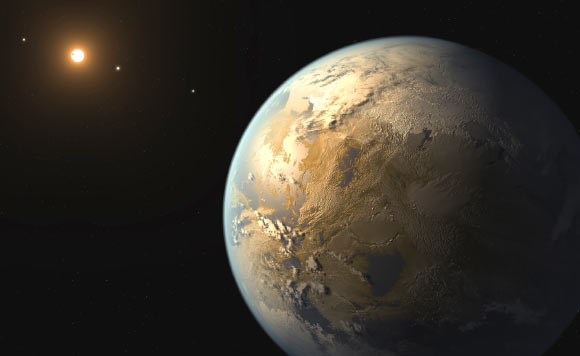The technology to ‘seed’ planets well beyond our solar system with basic life forms, skipping billions of years of evolution on Earth and spreading the potential for complex life to develop, might be decades away. This is according to an essay that will appear in the journal Astrophysics and Space Science, though its ambitions and ethical stance have been questioned by both supporters and detractors of so called ‘direct panspermia.’

This artist’s concept depicts an Earth-like exoplanet. Image credit: NASA Ames / JPL-Caltech / T. Pyle.
The essay by systems theorist Professor Claudius Gros introduces the Genesis project to grow earth life on another planet.
It is based on an understanding that many exoplanets are only temporarily habitable (due to unstable orbits, changes in star luminosity or alterations in the atmospheric composition), leaving only fleeting periods when life could develop.
On these planets complex multicellular organisms wouldn’t have the time to evolve.
Unless we decide to intervene.
“I am a great fan of life on Earth, I think it is beautiful,” says Prof. Gros. “My ambition comes from wanting to see it develop elsewhere.”
Whilst sending multicellular organisms would require a form of galactic Noah’s Ark, Gros believes we could relatively soon send autonomous self-assembling toolkits for producing and disseminating advanced unicellular organisms.
“The hope is that this will lead to complex life, though nature will decide what type of complex life it will be.”
Gros proposes delivering this gene laboratory via low-cost robotic micro-craft powered by orbit-based lasers, an approach inspired by the Starshot project to visit Proxima Centauri.
“The real challenge is not sending a probe but ensuring it survives thousands years of travel. However, this becomes less of an issue if, like the Starshot project, you accept a significant rate of failure by sending a fleet or probes.”
However, even with many probes, the chances might not favor successful genesis according to directed panspermia advocate Professor Michael Mautner, who describes propagating life throughout the Universe as a “principle human purpose.”
“It is hard to see how it [the production of cells] could be performed by robots pre-programmed for a given set of chemicals and parameters such as chemical concentrations, temperature, pH, redox potentials, when the starting chemicals and these parameters will be modified by space radiation in unpredictable ways by space radiation during travel times of tens of thousands to millions of years.”
And the challenges are not simply technical, but also ethical.
“The basic premise to deliberately seed other planets with earth life, would seem to run contrary to both international consensus planetary protection policy and national obligations under the 1967 Outer Space Treaty,” says NASA’s Planetary Protection Officer, Dr. Catharine A. Conley.
“Planetary protection policy exists to protect future scientific investigations.”
In order to avoid endangering alien life Gros proposes the probes head for uninhabited exoplanets, however, he admits this ethical standpoint might be difficult to guarantee.
“From a large distance we can only vaguely estimate [the possibility of life] so once the probe arrives it has to conduct more studies from the orbit. Whilst we are sure to detect complex life, we will never be able to completely rule out simpler life on the planet.”
There is also the question of who will pay for a mission that, by its creators admission, is “impossible to make a rational argument in favor of” and will ultimately be “useless for humanity.”
“National bodies may spend money on the project R&D, as the mission planning and spacecraft development would provide a lot of useful findings in forecast and simulating geophysical planet evolution.”
However, he points out, the final building and launch will probably come from private institutions.
_____
Claudius Gros. 2016. Developing Ecospheres on Transiently Habitable Planets: The Genesis Project. Astrophysics and Space Science, accepted for publication; arXiv: 1608.06087v2







